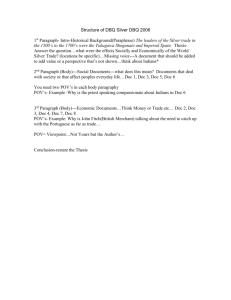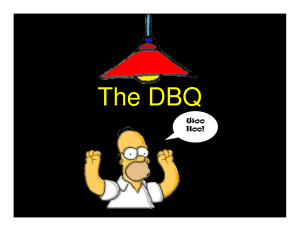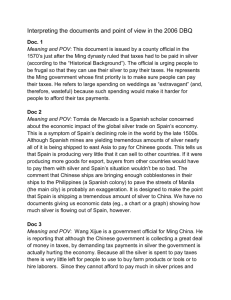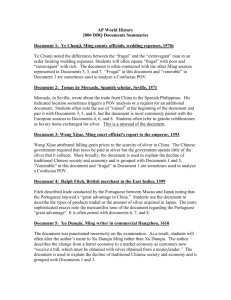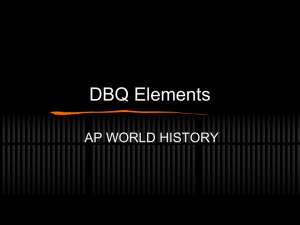Global Silver Trade DBQ: General observations: THE GOOD
advertisement
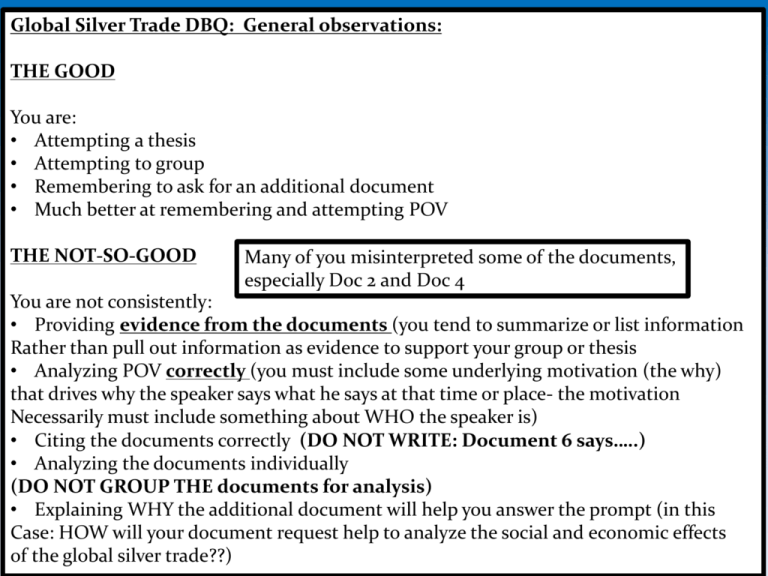
Global Silver Trade DBQ: General observations: THE GOOD You are: • Attempting a thesis • Attempting to group • Remembering to ask for an additional document • Much better at remembering and attempting POV THE NOT-SO-GOOD Many of you misinterpreted some of the documents, especially Doc 2 and Doc 4 You are not consistently: • Providing evidence from the documents (you tend to summarize or list information Rather than pull out information as evidence to support your group or thesis • Analyzing POV correctly (you must include some underlying motivation (the why) that drives why the speaker says what he says at that time or place- the motivation Necessarily must include something about WHO the speaker is) • Citing the documents correctly (DO NOT WRITE: Document 6 says…..) • Analyzing the documents individually (DO NOT GROUP THE documents for analysis) • Explaining WHY the additional document will help you answer the prompt (in this Case: HOW will your document request help to analyze the social and economic effects of the global silver trade??) MUST CLEARLY ADDRESS social AND economic effects! Thesis: Unacceptable: “There were many social and economic effects of the global trade in silver around the world.” “During the years 1500 to 1750, silver production became very popular. Spanish colonial America and Tokugawa Japan led the world in silver production.” MINIMALLY acceptable: “The global flow of silver trade from the mid- 16th century to The early 18th century produced profound social changes in Spain, Ming China, Tokugawa Japan, England and the Netherlands and greatly reshaped the world economy.” Acceptable: “ The global flow of silver had many social and economic effects, such as increasing class distinctions in China and Europe, as well as hurting Spain’s economy. “ Thesis Killers: (do not use these words) Very Many Things Lots Stuff Ways Thesis Helpers: While Although Despite In spite of AP Registration?? Deadline: March 4th Turn to Sample Student Response: Identify: • Thesis • 2 Point of View Statements • Request for Additional Document Grouping: • Highlighted the documents’ social (class/hierarchy/conditions)or economic effects (trade/ changes in currency/ positive/negative) • By regions/ authors (Spanish/ Chinese/ British) Example(s) of common document groupings: Issues could include: • Region/Point of origin (Spanish, Chinese, British) • Economic purpose • Profession • Competition • Negative or positive effects of the flow of silver • Corruption • Change over time (Chinese attitudes toward trade) Unacceptable “Docs 1, 3, and 5 all reflect the social impacts on China. Document 7 is the only one that deals with the economic effect on China.” A single doc cannot be a “group.” However, a single doc CAN belong to more than one group. Acceptable “The global flow of silver during this time period caused many disputes and changes economically between involved countries (Docs 4,8,and 2)This is an acceptable topic sentence that may lends itself to document analysis and appropriately ties back to the economic aspects of a thesis. Special Note: Occasionally students attempt to ‘Group Analyze POV’ by saying that 3 doc’s all share a particular POV. While this statement earns credit for Grouping, it does not “double dip” to earn POV credit as well. Both point #4 (POV) and #5 (Grouping) require analysis, but there is a subtle and important difference between the two types of analyses. POV applies to a single document. REMEMBER to write clear topic sentences per paragraph! Meaning: [Doc #2, Tomas de Mercado] “Because silver was of such value, countries such as Spain would get so much silver from China that the roads could be replaced with granite cobblestone to hold up all the silver. “ This is an obvious misinterpretation of Document 2 which reflects our current day POV of granite being “valuable.” ________________________________________________________________ [Doc #4, Ralph Fitch] “The Japanese use this silver to great advantage in China”…. The Japanese are not TAKING advantage of the Chinese, they are benefiting by using the silver to trade for Chinese goods. Evidence: Unacceptable: “In doc #8, Charles D’Avenant notes that the British had been supplemented by the Dutch in the spice trade, but have continued trade in the East Indies for “dyed cloth, silks, drugs, cotton-yarn, and wool”. Don’t even USE the word Unacceptable: “Document 6 says……” Document! “Doc 1, 2 and 3 say….” “A few documents were about….” Don’t use quotes! Acceptable: “ Spain was one of the countries that participated the most in the global flow of silver because of its numerous colonies, highly developed trading systems, and sense of mercantilism during the 16th and 18th centuries. For example, the Spanish colonies in the Americas experienced drastic changes in economy and exploitation of natural resources as Spanish conquerors put Indian laborers to work mining silver. The exchange of currency was beneficial for the Spanish while detrimental to the natives. Mass amounts of silver left the mines of America for Spain and these amounts were produced by the labor of Indians (Doc 6).” “The Spanish did not only experience positive effects from the global flow of silver. They began to experience high prices which ruined their economy as Spaniards became more attracted to Asian products (Doc 2). POV: Unacceptable: “Ralph Fitch (Doc #4) is biased because he is British.” “He Qiaoyuan (Doc #7), a Ming court official, wrote to the emperor that the trade ban should be lifted because they are very high prices for Chinese goods on the market.” Acceptable: “ As an English scholar, D’Avenant (Doc #8) would certainly have wanted to support England’s own economic gain and any Parliamentary movement that would accomplish this.” “He Qiaoyuan (Doc #7), a Ming court official, wrote to the emperor that the trade ban Should be lifted because they are very high prices for Chinese goods on the market. His motives are suspicious since goods from his native province are desirable and he Stands to gain from the lift of the ban, but this also shows a changing attitude of the Chinese on trade with foreigners.” ADDITIONAL DOCUMENT: DON’T ask for a document that you already have! MAKE SURE that you clearly state how the document that you are requesting will help you answer the question that you have.

